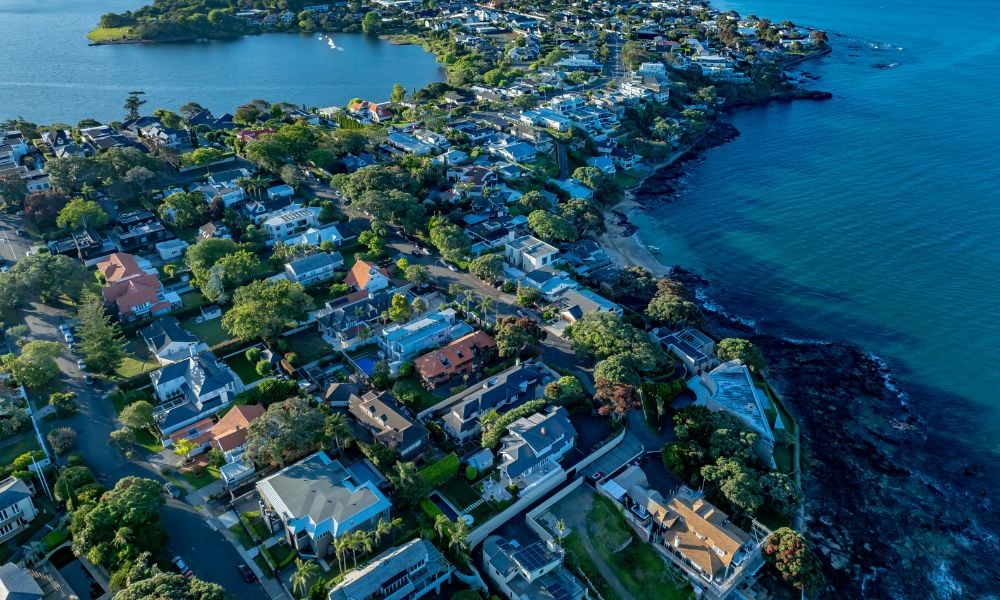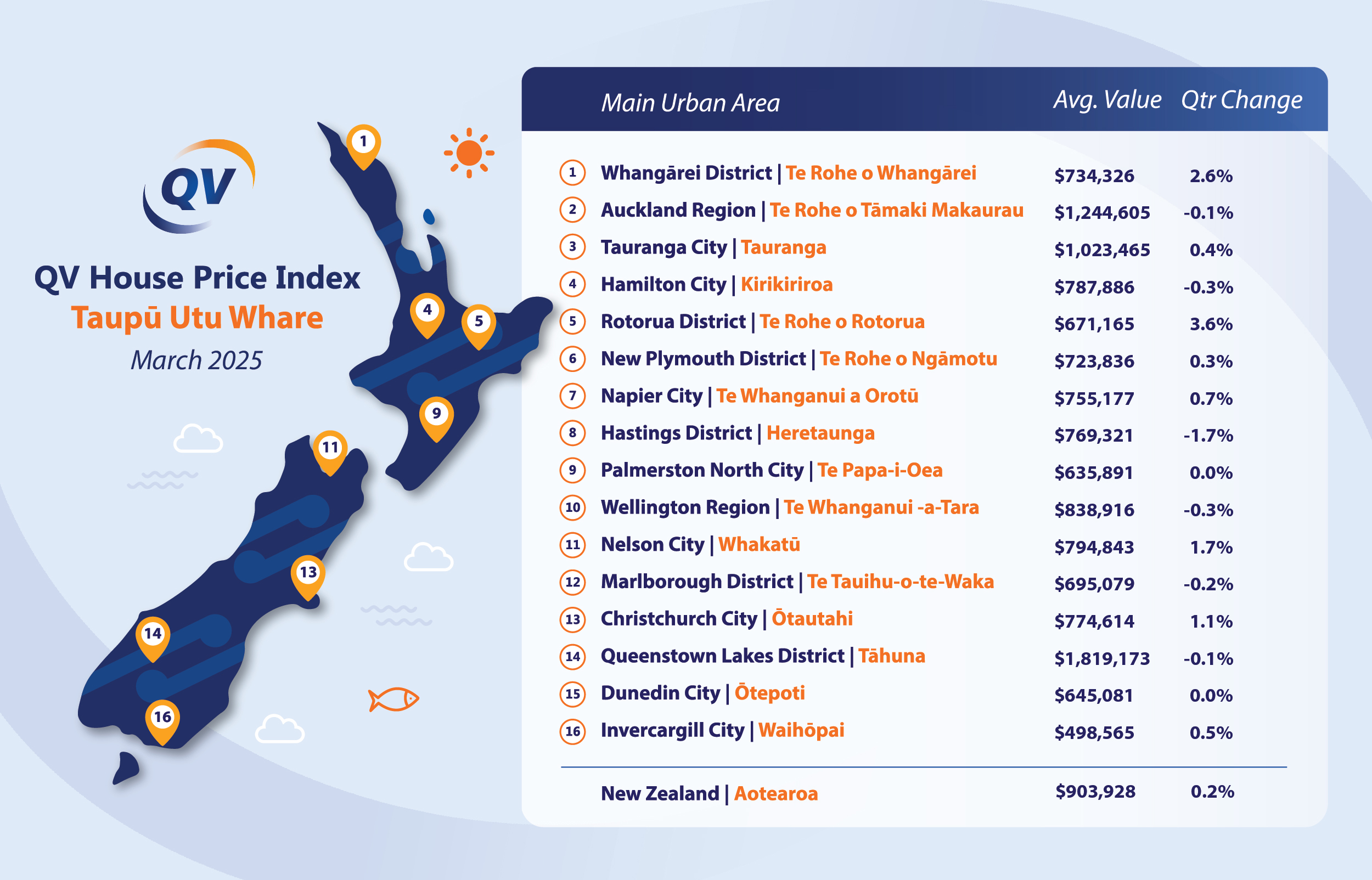The numbers are mixed, largely dependent on location

New Zealand's residential property values are at a standstill, according to QV's latest House Price Index.
In fact, home values in some of the nation's biggest cities — Auckland, Wellington and Hamilton — fell during 2025's first quarter, or the three months ending in March 2025, despite New Zealand's currently low official cash rate (OCR) of 3.75%. On average, however, the index found that residential home values were relatively flat, up just 0.2% to a national average of $903,928, during the quarter. That's down from the 0.5% growth recorded during the last report, 2.3% lower than a year ago, and 15% below the market's peak in late 2021.
“Although interest rates have reduced markedly, buyers are still finding the current economic climate to be a challenge," said James Wilson, QV operations manager. "Job worries and a rise in unemployment are causing many to be cautious and play it safe right now, which is understandable."
New Zealand's unemployment rate ticked up to 5.10%, during the December 2024 quarter. Some economists are predicting the number of unemployed Kiwis will rise to as much as 5.6% during the current quarter.
"This is one factor that has helped to keep the brakes on throughout the first quarter of 2025," Wilson said. "A sizable surplus of properties for sale is another. You don’t have to walk very far around the neighbourhood these days to see a for sale sign. Ample properties for sale and a lack of meaningful competition are helping keep prices really flat for now. That’s not a bad thing, as first-time home buyers continue to make up a larger share of the market overall."
He added that investor activity also continues to gain traction in New Zealand.
"A getting-in-early mindset appears to be emerging [for some investors]," Wilson said. "But this is also being tempered by a cautious approach to the economy."
New Zealand's economy has been in recovery mode thus far in 2025, slowly pulling itself out of a recession. But the nation is still navigating conflicting market pressures.
Market participants, including all of New Zealand's big banks — ANZ, ASB, BNZ, Kiwibank and Westpac — are optimistic that the Reserve Bank of New Zealand (RBNZ) will lower the nation's benchmark rate at its monetary policy meeting this week. The consensus is that the bank will slash rates by another 25 basis points down to 3.50%.
Wilson said, however, that it will take some time for New Zealand's property markets to fully return to normal, with a recovery likely to continue into the winter months.
“It’s going to take some time before interest rate relief fully takes hold and for the labour market to regain its footing again," he said. "In the meantime, those who are in a position to purchase are going to benefit from having a wider selection to choose from.”

By the numbers — here's what advisers need to know
While the overall report found that residential property prices in New Zealand aren't moving much, QV's House Price Index by the numbers is actually quite mixed, with property values largely dependent on location. In Rotorua, Whangarei, Nelson and Christchurch, values increased by 3.6%, 2.6%, 1.7% and 1.1%, respectively. Meanwhile, home values fell in Auckland, Wellington and Hamilton, down -0.1%, -0.3% and -0.3%, respectively. Palmerston North and Dunedin remained flat.
In Auckland, the country's largest city, home values fell -0.1% to roughly $1.24 million. That's an average of 3% less for homes in Auckland than a year ago, and 19.2% less than the 2021 market peak.
Hugh Robson, a QV registered valuer, said Auckland's residential property market has likely hit a bottom, with prices stabilizing. Yet, he added, the chance of near-term growth is also unlikely as "the market plods along with not a lot happening."
"There just isn't a large amount of demand," Robson said. "First-time homebuyers are the most active sector. But agents are reporting fairly low attendance at open houses.
"There is quite a lot of stock on the market at the moment," he said. "It seems many people are still understandably concerned about retaining their jobs and about dealing with the high cost of living."
Marshall Wu, a QV registered valuer in the Waikato District, south of Auckland, added that the market will likely remain subdued throughout the winter.
"Persistent economic uncertainties, including rising unemployment, weakening business conditions and the potential imposition of higher tariffs by the US, continue to impact market conditions," Wu said.
"While March is traditionally the busiest month of the year for the residential market, unsold inventory remains relatively high," he said. "This is providing buyers with more choices and less urgency in making purchasing decisions, while some sellers are compelled to lower prices to secure sales.”
Down in the nation's capital, Wellington average home values fell by 0.3% in the quarter to $838,916. That's a turnaround from the 0.3% in the last index. It's also a 4.2% decline from a year ago and 23.2% drop from the 2021 peak.
David Cornford, a QV senior consultant, said Wellington-area buyers have been active in the last three months. "Particularly among first[-time] home buyers," he said. "However, the number of properties on the market is providing them with plenty of options, as well as some extra bargaining power. It will likely take some time to work through this existing stock and we’ll have to see an uptick in general economic and employment confidence in the capital before any significant improvements in the market flow through.”
The Wellington-area exceptions were the Kapiti Coast District and nearby Porirua, which both grew in value during the quarter, up 1.9% and 0.6%, respectively.
Queenstown values rose just 0.1% to just over $1.81 million. But that's a decrease of 0.4% from a year ago.
By region, the Northland was relatively flat during the quarter. While prices in Whangarei rose 2.6% to an average home value of $734,326, homes in the Far North district fell -2.8% to $674,678. On the West Coast, the average home value rose 5.2%, year-over-year, while the south island's Canterbury region remained relatively flat. Home values in Christchurch, the area's biggest city, grew 1.1% since the start of 2025 to an average of $774,614.



